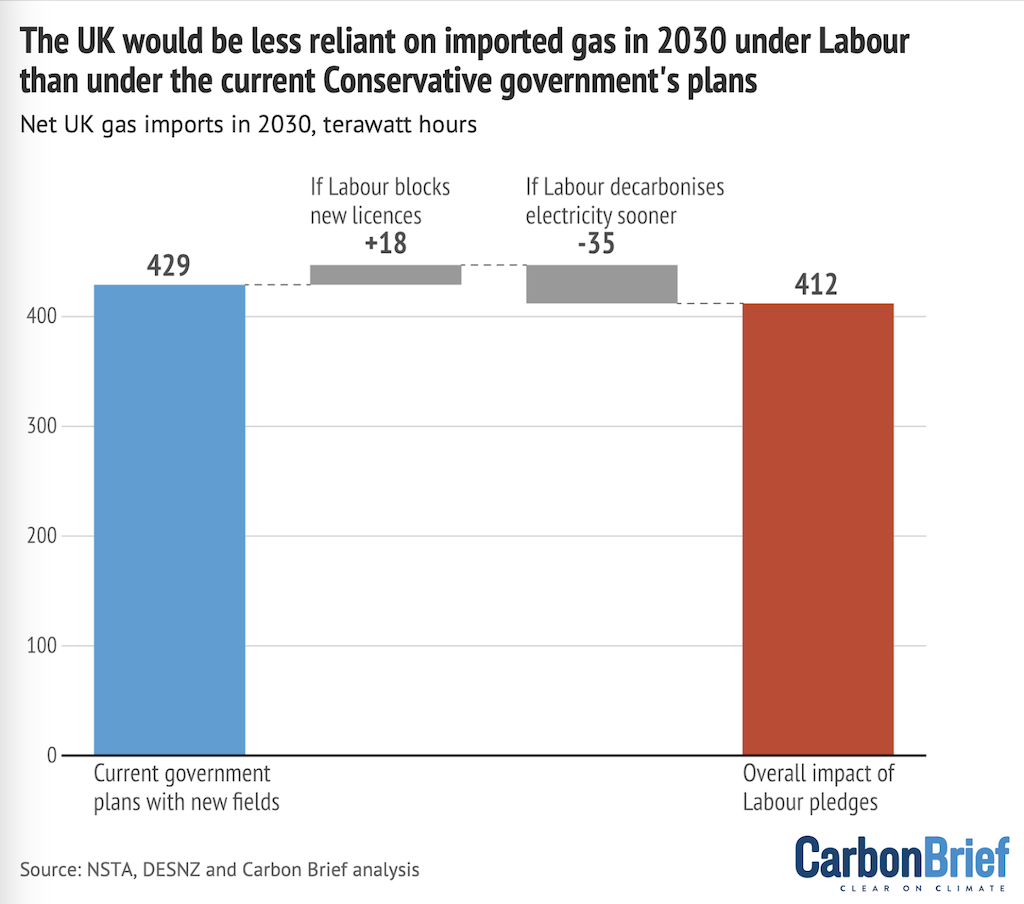The UK would need less imported gas by 2030 under pledges made by the opposition Labour Party, than under the Conservative government’s current plans, new Carbon Brief analysis shows.
Labour has pledged, if elected, to end new drilling licences for North Sea oil and gas, leading to accusations from government ministers that it would “make the UK reliant on tyrants” due to increased gas imports.
But the pledge on new oil and gas licences is not the only part of Labour’s plans.
Labour has also pledged to decarbonise the UK’s electricity system by 2030 – five years earlier than the current government plans.
Taken together, Carbon Brief analysis shows that the Labour pledges would actually cut UK demand for imported gas in 2030, even after accounting for lower production from the North Sea.
Import reliance
According to the North Sea Transition Authority (NSTA), the UK’s net gas production is set to fall by three-fifths this decade, from 379 terawatt hours (TWh) in 2022 to 161TWh in 2030.
(Net production is gross output minus any gas used to run oil platforms. In 2022, the NSTA says 11% of gross gas production was used in this way. It expects this share to increase by 2030.)
As a result of falling production – and despite falling demand – the NSTA expects the UK’s net gas imports to have reached 429TWh in 2030, even if new fields are developed.
This is shown by the blue bar in the figure below.
Some 18TWh (11%) of forecasted net output in 2030 is tied to new licences, the NSTA says. If it wins power at the next election (which is widely anticipated to take place in the second half of next year), the Labour Party would block these new developments.
At the same time, the Labour Party has pledged to decarbonise the power sector by 2030, five years earlier than under current government plans.
This would save up to 35TWh of gas in 2030, also shown in the figure below.
Therefore, in total, the two Labour pledges would see net UK gas imports in 2030 fall by up to 17TWh (4%) compared with current government plans (red bar).

Current government plans to decarbonise the power sector by 2035 would include 15-20TWh of gas-fired electricity in 2030, according to government projections.
Generating 15-20TWh of gas-fired electricity in 2030 would require the use of 30-40TWh of gas, based on the current average efficiency of UK gas plants (50%).
In contrast, Labour’s pledge to decarbonise the grid by 2030 would mean there would be close-to-zero demand for electricity generation from unabated gas.
(For the purposes of this analysis, it is assumed that a very small amount of residual unabated gas generation – 2.5TWh – would remain in 2030, as in the pathway set out by thinktank Ember.)
This means the Labour pledge would cut gas demand in 2030 to 26-35TWh below the level expected under the current government’s plans.
Sharelines from this story
- SEO Powered Content & PR Distribution. Get Amplified Today.
- EVM Finance. Unified Interface for Decentralized Finance. Access Here.
- Quantum Media Group. IR/PR Amplified. Access Here.
- PlatoAiStream. Web3 Data Intelligence. Knowledge Amplified. Access Here.
- Source: https://www.carbonbrief.org/analysis-uk-would-need-less-imported-gas-under-a-labour-government/



